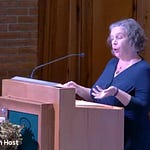At a packed town hall in Lincoln, Nebraska, this August, Republican Congressman Mike Flood faced a scene he likely didn’t expect. He was there to defend the new “one big, beautiful bill” – a sweeping measure that included deep cuts to Medicaid and SNAP. Cuts he said were simply about reducing “waste, fraud, and abuse.” (1)
But instead of applause, the room erupted in boos. People shouted him down, chanting “Vote him out!” and “Tax the rich!”—for over an hour. These weren’t progressive activists flown in from out of town. They were his constituents, many of whom had probably bought into that same waste-and-fraud story in the past. But something had shifted in them. They now realized those cuts weren’t aimed at some distant “undeserving” stranger. They were aimed at them, their parents, or their neighbors.
Before we have personal experience, stories shape how we understand a topic. For decades, “waste, fraud, and abuse” has been thrown around as a catch-all phrase. The phrase is easy to remember because it taps into something primal. We don’t want to be cheated. We don’t want someone else to get more than their fair share.
Fairness is an innate human value. Turns out, it’s also a value of primates, which brings me to a famous experiment with monkeys, cucumbers, and grapes.
Researchers Frans de Waal and Sarah Brosnan put two capuchin monkeys side by side. Each one was trained to hand over a small rock. If the monkey completed the task, she got a piece of cucumber. At first, both monkeys were perfectly happy munching on their cucumbers. But then one of them was given a grape instead – a sweeter, higher-value treat. The other monkey watched. And suddenly, her cucumber was no longer acceptable. She threw it back at the researcher in protest, with really good aim.
I laugh hard each time I watch the video; I’ve included the YouTube link in a footnote.(2) But there’s a deeper truth there. We know this feeling. We’re fine with our paycheck … until we learn a coworker makes more for the same job. We’re fine waiting in line … until someone cuts ahead. Kids are fine sharing toys … until someone else gets the “special” one.
Fairness is part of our human survival wiring, but it also has a shadow side. That instinctive reaction can be manipulated and that’s exactly what happened with the rise of the “waste, fraud, and abuse” story.
Let’s go back to 1976 when Ronald Reagan popularized the story of a Chicago woman who came to be known as the “welfare queen.” (3) He told crowds she drove a Cadillac and lived lavishly while collecting welfare checks under dozens of names.
Indeed there was a woman who committed fraud, but she was one extreme case. Reagan’s retelling turned her into a cultural symbol. The implication was clear: if one woman was living large on taxpayer money, then many others must be as well.
That framing was powerful. One political scientist traced how Reagan’s story shifted public opinion, repeating one sensational case until it colored how people imagined welfare as a whole.
Now the phrase “waste, fraud, and abuse” gets tossed into speeches and debates like punctuation. It’s quick. It’s sticky. And it plays right into our monkey brain: someone else is getting more grapes than I am. MY tax dollars are supporting people who aren’t deserving.
The problem is, the reality doesn’t line up with our inner dialog. Surveys show that many Americans believe fraud in welfare programs is widespread – that nearly half the budget is lost to abuse. But real-world data shows something different: the actual fraud rate is under 2%, a fraction of the size of people’s assumptions.(4)Perception, once fueled by story, is stronger than reality.
That’s why the town hall in Nebraska was so striking. For years, the story worked. But the moment people realized the cuts were aimed at them or people they knew, the story cracked. It wasn’t someone “out there” driving a Cadillac, it was real people who were doing the best they could and still struggling.
The real story of waste and fraud is not as sticky. The majority of waste, fraud, and abuse comes from institutions: hospitals, insurance companies, and corporations. Some cases are sensational, like a Michigan doctor who diagnosed healthy patients with cancer so he could bill for expensive treatments. (5) More often, though, the fraud is less dramatic: hospitals overbilling Medicare, pharmaceutical companies inflating drug prices, or insurance companies exploiting loopholes to deny care while collecting payments. These damages add up far quicker than any individual could possibly accumulate, but they don’t make good stories.
Justice Department data shows the pattern clearly: most fraud comes from hospitals, insurers, and providers – not from families using the programs. In just one year, the government recovered over a billion dollars in false healthcare claims – most of it from corporations and hospitals, not individuals. (6)
But that story rarely makes the headlines. Instead, the public is told to be angry at the neighbor in the checkout line, the single mom on Medicaid, or the family using SNAP benefits. All because it’s easier to focus resentment on the visible individual than to confront the power of large systems.
So fairness gets distorted. Instead of asking why the powerful are misusing the system, we’re told to be angry at the vulnerable.
Policy research confirms this ripple effect. When people believe fraud is rampant, they’re more likely to support cutting programs, even ones they themselves depend on, like Social Security, Medicare, or disaster relief. In other words, the story of the grape convinces us to throw away the cucumbers we may one day need.
But there’s a larger truth here, too. We rarely see the whole picture of someone’s life. Even the monkeys were reacting only to what was right in front of them. The one given a cucumber might have had the larger cage, or more toys, or better treatment in another moment, but that wasn’t visible.
All that mattered was the grape in the neighbor’s hand.
It’s the same with us. We see a sliver of someone’s circumstances, and from that fragment we decide whether they are “deserving” or not. Yet every life is complex. Every life carries both joy and struggle, gifts and disappointments.
My mother once told me that you should never be jealous of someone unless you’d be willing to trade lives with them – completely. Not just their good parts, but their hardships, too. That’s always stayed with me because it reminds me that envy is selective: it sees only the grape, never the fuller picture of the cage.
But what happens if we stop judging by slivers of someone’s life and start looking at the whole of their life, using the spiritual lens of love?
The monkey brain says: guard your cucumber, don’t let anyone else get more than you. But spirituality invites us into a different story. One that asks us to love others as we love ourselves and to take care of those who need food, clothing, or shelter.
What if fairness is about ensuring everyone has enough, rather than making sure no one cheats?
Fairness is a seed. But love is the fruit.
Love of self – so we don’t live clenched in envy. That we remember the beauty of our own life.
Love of others – so we honor their dignity as equal to ours. That we see the completeness of their lives, with their joys and sorrows.
Love of the Infinite Mystery – that presence calling us from scarcity into abundance.
When fairness is shaped by love, it stops being about cucumbers and grapes. It becomes about seeing whole lives, not fragments. About making sure everyone at the table is fed.
So maybe the invitation is simple: notice where the monkey shows up in you. When do you want to throw the cucumber back and shout, “It’s not fair!”?
Fairness lives in our biology. But love – love for self, for others, and for the Infinite – shows us how to use it. How to move beyond resentment into connection. Beyond cucumbers and grapes into a vision where dignity belongs to everyone.
Where growing more love feeds the world.
Joni Miller, Ph.D., is a writer, researcher, spiritual coach, and speaker who uses her knowledge, education, and love of all things spiritual to help spiritual wanderers find a place they can call home, navigating by the light of Love. www.SpiritualGeography.net
Photo by Vo Huy: https://www.pexels.com/photo/photo-of-two-monkeys-sitting-on-rock-2830780/
(2)
(Fairness research video)
(5) https://apnews.com/general-news-dea1e9256cfa46d782e513d160557ee3 (Michigan doctor)
https://oig.hhs.gov/newsroom/media-materials/2025-national-health-care-fraud-takedown/












